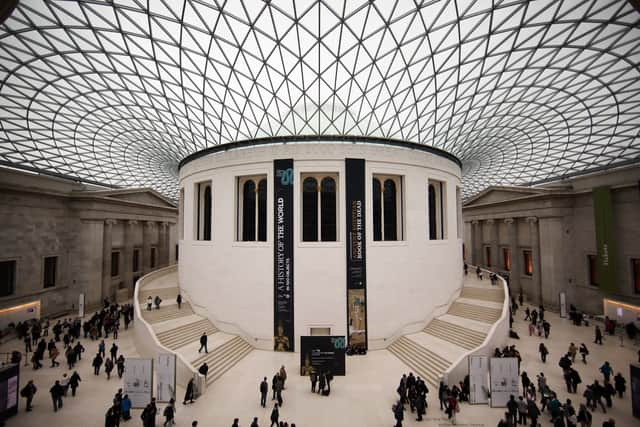Poet and translator to sue British Museum for copyright and moral rights infringement
and live on Freeview channel 276
The British Museum is being sued for copyright and moral rights infringement by Vancouver-based writer, poet and translator Yilin Wang.
Ms Wang has raised over £15,000 via hundreds of contributions to her Crowd Justice campaign after she discovered the British Museum, China's Hidden Century, used her published translations of Chinese feminist poet, Qui Jin's poetry, without any permission, credit or payment.


The case
Advertisement
Hide AdAdvertisement
Hide AdAccording to Ms Wang's campaign page, the museum used her translations of Qiu Jin's poetry in multiple formats - in a giant projection, on a sign, in digital and print audio guides, in audio form and in transcript.
However, none of Ms Wang's work has been credited nor cited.
On Twitter, Ms Wang wrote: "hey @britishmuseum, I am demanding all my translations to be removed from the China's Hidden Century exhibit and all materials pertaining to the exhibit"
The award-winning writer revealed the extent of translations used which she alleges to be her own. She states that the amount of work she puts into her research, which includes reading more than 200 Qui Jin's poems "about five times" and taking "a week to several months, perhaps at an average of 20-50hrs” to research and translate each poem."
Advertisement
Hide AdAdvertisement
Hide AdAfter being challenged, the museum removed her translations from its exhibition, however, Ms Wang says this has "added insult to injury" as it claimed it had "forgotten to credit me in the exhibit and offered to acknowledge me and to send me a permission form, whilst emphasizing how other contributors let them use their work for free or at a low cost."
She says that, before she responded to the British Museum's response - as there is an eight-hour time difference - it contacted her again 24 hours later to tell her it had removed all her translations from the exhibit, as well as the Chinese original.
How did the British Museum respond?
The museum said the "translations came down at Ms Wang's explicit request". In a statement, it says it “fully accepts it made a mistake, has apologised to Ms Wang and sought to make amends financially. We have not offered just £150 as Ms Wang has suggested but £600. This is benchmarked to industry rates”.
The statement continues: "The museum didn’t consider it appropriate to continue using the translations when Ms Wang had expressly informed us that they did not consent to their use and there had been no engagement with the museum’s efforts to obtain their consent. We engaged with Ms Wang as soon as we were alerted to the issue they raised and we have acted in good faith trying to resolve this through the appropriate channels and directly with her—not on social media."
Advertisement
Hide AdAdvertisement
Hide AdMs Wang denies she asked for her work to be removed, but to be taken down "unless I was promptly remunerated and credited for [its] use". The British Museum has said it cannot reinstate her translations "for practical reasons".
She said on her campaign page: "The current position is the worst possible outcome - the public are now not only being denied the chance to see my translations and to know who wrote them but also the chance to read Qiu Jin's words too. The result is that two female writers of colour have both had their work erased. We are not disposable."
According to the British Museum, this exhibition was born from the work of over 400 people from 20 countries, including 30 lenders and other contributors. The show is the culmination of a four-year-long research project made possible by a grant of more than £700,000 and led by two British academics.
What is the copyright and moral rights infringement case?
Ms Wang explains that since she and the British Museum have failed to reach an acceptable settlement, she will now "be working with lawyers in the UK to bring a claim against the British Museum for its infringement of my copyright and moral rights in the Intellectual Property Enterprise Court (IPEC), which is a specialist court and part of the Business and Property Courts of the High Court of Justice in London."
Advertisement
Hide AdAdvertisement
Hide AdAccording to The Art Newspaper, Jon Sharples, an intellectual property and art lawyer with Howard Kennedy LLP, says it is “shameless” to say that Wang will not now be credited “because both her words and the original words of feminist revolutionary poet Qiu Jin will remain airbrushed from the exhibition”.
He adds: “One wonders what the sponsors of the show, Citibank and the Huo Family Foundation, think of this reckless disregard for the value of poetry and its place in Chinese culture.”
Sharples says the legal case will focus on copyright and on Ms Wang’s moral rights, in particular, the right to attribution—or the right to be named or identified as the author.
Mark Stephens, a partner at Howard Kennedy LLP, says the British Museum has “handled this in a high-handed and cavalier manner”.
Advertisement
Hide AdAdvertisement
Hide AdHe adds: “It is really shoddy for a large, national organisation that holds itself out as a bastion of British enlightenment and fair play to conduct themselves in this way" and describes the misuse of Wang’s work as “just the latest example of the British Museum’s colonialist attitudes and rapacious spoliation of other cultures”.
Comment Guidelines
National World encourages reader discussion on our stories. User feedback, insights and back-and-forth exchanges add a rich layer of context to reporting. Please review our Community Guidelines before commenting.
